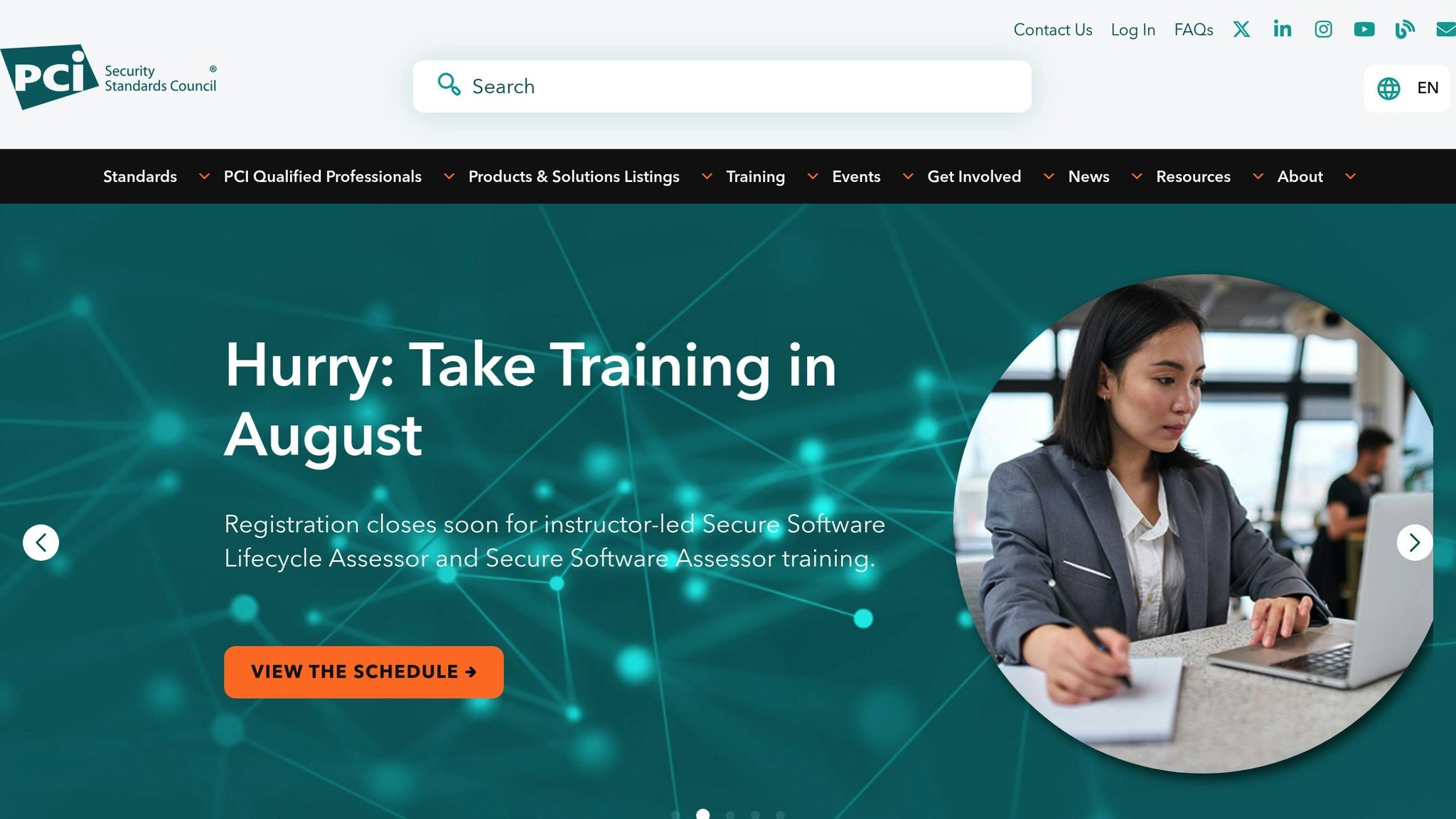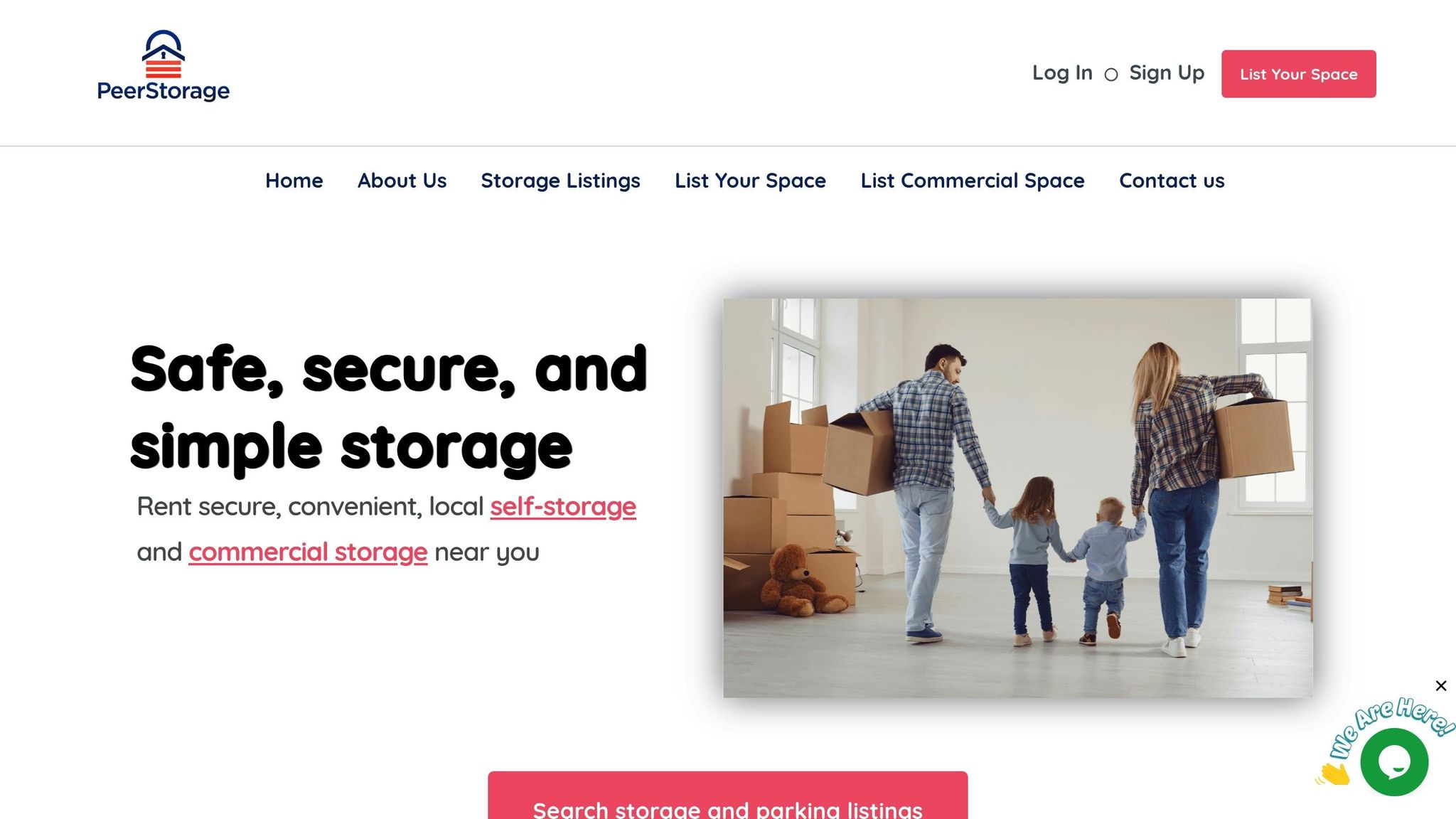How to Profit from the New Self-Storage Business Model
- September 22, 2025
- Make Money, Self Storage
In the ever-changing world of commercial real estate, self-storage has emerged as a unique and lucrative asset…
Read More
Online payment security is crucial in storage marketplaces to protect your financial details and build trust between renters and hosts. Here’s what you need to know:
Key takeaway: Secure payment systems protect users and create a trusted environment for seamless transactions. PeerStorage employs advanced tools and policies to ensure your financial safety.
Payment systems use a combination of advanced technologies to protect your financial information, ensuring that transactions remain secure and private. These features work together to block unauthorized access and reduce risks. Let’s dive into the key components that safeguard these systems.

Encryption is a cornerstone of payment security. It transforms your payment information into a secure code as it travels between your device and the payment processor. For example, on PeerStorage, your card details are encrypted immediately, ensuring they remain safe during transmission.
To bolster this, the Payment Card Industry Data Security Standard (PCI DSS) establishes strict guidelines to protect cardholder data. Companies must secure their Cardholder Data Environment (where card data is stored, processed, or transmitted), enforce strong access controls like unique user IDs and two-factor authentication, and ensure data encryption both in transit and at rest. Additionally, PCI DSS mandates robust network security measures, all aimed at reducing fraud and keeping sensitive data safe.
Paired with encryption, tokenization takes security a step further.
Tokenization is another key feature that replaces your actual credit card numbers with a unique, randomly generated token. When you save a payment method on PeerStorage, the system swaps your card details for a token. Even if this token were exposed, it’s useless outside the secure environment of the payment system. This approach is especially helpful for recurring payments, as it keeps your real payment information inaccessible to unauthorized parties.
Security doesn’t stop at protecting data – it extends to detecting and preventing fraud. PeerStorage employs several tools to ensure every transaction is legitimate.
Together, these layers of protection create a secure environment for all your payment activities.
Managing payments, refunds, and disputes is an essential part of using storage marketplaces, whether you’re a host or a renter. These platforms have established systems to ensure fair and efficient handling of financial transactions.
PeerStorage processes host payouts using ACH transfers, which typically take 24–48 hours after payment clearance to arrive in your account. However, delays can occur on weekends or federal holidays. The exact timing also depends on your bank – some process deposits within hours, while others may take longer.
The payout you receive is the rental fee minus the platform’s service fee. PeerStorage also takes care of tax reporting and will issue a 1099-K form if your annual earnings exceed $600.
Now, let’s look at how refund and cancellation policies are structured to protect both hosts and renters.
Refunds vary depending on how soon a cancellation occurs after booking. If you cancel within 24 to 72 hours, the platform typically uses an authorization reversal, which removes the charge from your statement entirely, as if the transaction never happened.
For cancellations made after this period, a standard refund is issued, which usually takes 3 to 5 business days to appear in your account. Refunds to debit cards can be quicker, sometimes showing up within 1 to 2 business days.
The cancellation policy is tiered:
If you’re using a prepaid card or digital wallet, refunds may be issued as account credits. Check your payment method’s refund options before booking to avoid surprises.
When refunds or cancellations don’t resolve an issue, the platform’s dispute resolution system steps in to help.
Disputes can arise for various reasons, but storage marketplaces have structured processes to address them fairly. The key to resolving disputes is acting quickly and keeping thorough documentation.
If you’re a renter dealing with issues like no-shows, access problems, or misrepresented spaces, contact the platform’s support team immediately. Most platforms require you to report access issues within 24 to 48 hours for same-day rentals. Be sure to take photos of the issue, save screenshots of your communication with the host, and note the exact time you attempted to access the space.
For hosts, problems like property damage or policy violations require prompt action. Document any damage with photos, gather witness statements if possible, and report the issue to the platform within 72 hours.
Dispute resolution usually involves three steps:
Chargebacks are a more serious escalation, where renters dispute charges directly with their credit card company. These can take 60–90 days to resolve, and hosts must respond promptly to notifications by providing all relevant documentation, such as rental agreements, proof of space access, and evidence of services rendered.
During active disputes, the platform temporarily holds funds until the issue is resolved. While this protects both parties, it can create temporary cash flow challenges for hosts. Keeping detailed records of all transactions, communications, and agreements is your best defense in these situations. Solid documentation can make all the difference in resolving disputes in your favor.
PeerStorage already offers robust payment security features, but staying vigilant is key to protecting your funds and personal information. Scammers often target hosts and renters with schemes designed to bypass platform safeguards. By combining cautious practices with PeerStorage’s encryption, tokenization, and fraud prevention tools, you can better protect yourself.
Here’s how to identify and steer clear of payment-related fraud:
To maximize the platform’s built-in protections, always keep interactions and transactions within PeerStorage.
For more detailed tips, PeerStorage offers tailored safety advice for both hosts and renters.
Whether you’re hosting or renting, these tips can help you stay secure:
Ensuring payment safety is a cornerstone of peer-to-peer storage platforms. Without proper security measures, users could face risks like misdirected payments, fraud, or unauthorized access to sensitive information, creating significant financial vulnerabilities. A secure payment system doesn’t just protect users – it also builds the trust essential for a thriving marketplace.
Encryption and authentication protocols play a key role in fostering trust and transparency. These measures reassure users that their financial details are safeguarded during every transaction. Beyond protecting financial data, privacy measures ensure that transaction details remain confidential. Together, these elements lay the groundwork for a marketplace where both hosts and renters can confidently participate without fear of security breaches.

PeerStorage takes these principles seriously by partnering with Stripe, a leading third-party payment processor, to manage all transactions securely and automatically. This collaboration ensures that users’ banking and credit card information is stored securely and never misused.
The platform doesn’t stop at secure payment processing. PeerStorage has implemented rigorous user verification processes, including detailed background checks. For added peace of mind, hosts are backed by a $10,000 damage guarantee, which acts as secondary protection after other insurance policies are applied. By combining secure payment handling, thorough user verification, and financial safeguards, PeerStorage creates an environment where users can focus on their storage needs instead of worrying about security risks.
To keep your payment information secure on PeerStorage, it’s a smart move to enable multi-factor authentication (MFA). This adds an extra layer of safety by requiring a second step, like a code sent to your phone or a notification from an authentication app. If available, you can also opt for biometric verification – such as fingerprint or facial recognition – for both security and ease of use.
Make it a habit to update your app regularly and check your security settings to ensure everything is current. Choosing strong, unique passwords and steering clear of public Wi-Fi for transactions are additional ways to minimize risks. When combined with PeerStorage’s built-in security measures, these actions can go a long way in guarding against fraud and unauthorized access.
PeerStorage is dedicated to providing a fair and efficient way to resolve conflicts between hosts and renters. If any issues come up, users can contact PeerStorage’s support team directly through email or the platform’s contact section. The team focuses on open communication, working closely with both parties to address concerns.
Although PeerStorage encourages informal resolutions through direct conversations, its process ensures that disputes are handled quickly and transparently, helping to build trust and maintain fairness for everyone involved.
If you think you’ve encountered a scam or notice anything unusual on PeerStorage, stop all transactions right away and reach out to PeerStorage’s customer support. They’ll help you figure out the next steps to secure your account and address the issue.
It’s also a good idea to alert your bank or financial institution to protect your accounts. If needed, report the matter to local law enforcement. Be cautious and avoid sharing personal or banking details if something doesn’t feel right. Staying alert is crucial for keeping your experience safe and secure.
Join The Discussion